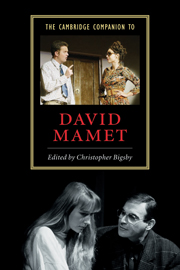Book contents
12 - Misreading Mamet
Published online by Cambridge University Press: 28 May 2006
Summary
That is why “realistic” acting rings so false. “Realism” – the concern with minutiae as revelatory of the truth – was an invention of the nineteenth century, when The Material seemed to be, and, perhaps, was, the central aspect of life. Our own time has quite understandably sickened of The Material, and needs to deal with things of The Spirit.
David Mamet “Some Lessons from Television,” in Some Freaks, p. 64.After reading 1,200 reviews and 200 articles and book chapters on Mamet for David Mamet: A Resource and Production Sourcebook, our sense is that reviewers, and many scholars as well, have misunderstood Mamet - from his first productions to the present. By Mamet, we mean the playwright/director David Mamet, not the playwright alone. Most reviewers fault Mamet's direction of his own plays. It certainly is possible to fault a playwright as director, but the objection is that his theory of drama is at fault in his directing. But it is the same theory which underlies the construction of the plays. What is at issue is the idea of realism which critics expect in Mamet's plays, but which he seems not to deliver.
In “Mamet vs. Mamet” Todd London argues, in American Theatre, that Mamet the theorist and director is Mamet the playwright’s “own worst enemy.” The argument is straightforward – Mamet is a realist, but he refuses to direct his plays realistically. London’s words provide a good starting point on realism: “Whereas many of the playwrights of the ’60s and early ’70s experimented with fluid characters who transformed before our eyes, Mamet’s creations have always been essentially fixed beings, defined by their actions, limited by their native tongue” (18).
- Type
- Chapter
- Information
- The Cambridge Companion to David Mamet , pp. 220 - 242Publisher: Cambridge University PressPrint publication year: 2004



